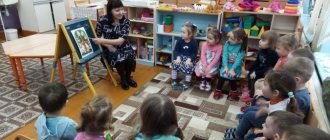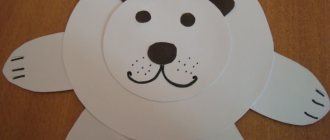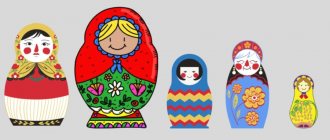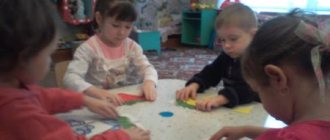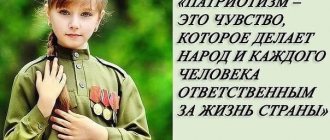Junior group. Early childhood, nursery. Children 1-4 years old
Direct educational activities for the patriotic education of children of the first early preschool age “Family” Direct educational activities for the patriotic education of children of the first early preschool age “Family”
Goal: creating conditions for the formation of a sense of belonging to one’s family as the basis
for the patriotic education of preschool children .
Objectives: Educational:... Outline of a lesson on moral and patriotic education for children 2 years old “Family customs in Russia” MUNICIPAL BUDGET PRESCHOOL EDUCATIONAL INSTITUTION KINDERGARTEN No. 10 “NUTCRACKER”
MUNICIPAL EDUCATION OF SAYANOGORSK
Summary of an open lesson Plan - summary of a lesson on moral and patriotic education for children 2 years old . Topic: “Family customs in “Rus”
”...
Patriotic education of children 2-3 years old in kindergarten
Social and moral education of young children as a prerequisite for the formation of patriotic feelings using the example of the work of the Pervomaisky Kindergarten MBDOU (from work experience)
Ryzhkova E. M., Municipal budgetary preschool educational institution “Pervomaisky kindergarten”, Pervomaisky district, Tambov region
The words of N. A. Dobrolyubov are very relevant today: “Reasonable education requires that at a very early age, even before children become well to be conscious of themselves, the desire for everything good and true was instilled in them. Early habits will serve as the foundation on which life’s knowledge of morality and nobility rests (is built). Early childhood is a very favorable period for development, formation and education in general. The psyche of children of this age is very plastic, so you can “sculpt” anything out of them, the main thing is to know which points to influence. Patriotic education of children begins not even from an early age (from one to three years), but from infancy. We can say that children absorb patriotism with lullabies performed by their mother, with jokes, nursery rhymes, and nursery rhymes. In infancy, patriotic education is carried out through the love and care of loved ones, through positive relationships between mom and dad, and through Russian folklore. Patriotic education of young children begins with the child’s close environment. And the formation of relationships in one’s family can be considered the first stage in the education of patriotism. A child’s sense of homeland begins with his relationship to his family, to the closest people - father, mother, grandmother, grandfather. These are the roots that connect him with his home and immediate environment. If a family has its own unique habits, such as celebrating the New Year, birthdays together, preparing gifts for each other, relaxing together; then all this gradually and thoroughly enters into the child’s social experience, like the most pleasant and dear memories that one wants to relive again. The second stage of the patriotic education of a young child can be considered his/her admission to kindergarten and, accordingly, the formation of a positive attitude towards the preschool institution. Here the main burden falls on the kindergarten staff. The purpose of pedagogical support for patriotic education is to create conditions for the formation of the foundations of patriotic consciousness of children, the possibility of positive socialization of the child, his comprehensive personal, moral and cognitive development, the development of initiative and creative abilities based on types of activities appropriate for preschool age. The objectives of the moral and patriotic education of young children are: • nurturing in the child love and affection for his family, home, kindergarten, street, city; • formation of a caring attitude towards nature and all living things; • fostering respect for work; • development of interest in Russian traditions and crafts; • formation of basic knowledge about human rights; • development of a sense of responsibility; • formation of mutual understanding and friendship between children, empathy. These tasks are solved in all types of children's activities: in classes, in games, in work, in everyday life - as they instill in the child not only patriotic feelings, but also form his relationships with adults and peers. The main goal of working with young children is to familiarize them with their immediate environment, that is, with those objects that surround children in life: plants in the area and groups, pets. A good means of education is the organization of work activities. For example, with your baby you can water the flowers in the flowerbed, scrape the leaves in the fall with a baby rake, rake sand up a hill, hang feeders and feed the birds in winter, etc. Don't forget about playing in the yard. The organizer of such games is an adult or older children. With young children, it is necessary to take walks, observing the phenomena that occur around and noticing changes. Teachers are planning didactic games to reinforce the concepts of vegetables and fruits, domestic and wild animals. Children become familiar with the world around them through looking at paintings, illustrations, and reading fiction. When working with young children, kindergarten teachers pay great attention to the concept of “family” and conduct ethical conversations about family and close relatives. Together with adults, children prepare gifts for family and friends for the holidays of February 23, March 8, Red Easter, Victory Day. Teachers organize conversations with children (“My dad”, “My mother”, “My grandmother’s house”, “How we vacationed with dad and mom”), didactic games (“Whose baby”, “Who has what mother”), finger games games (“Family”, “Magpie Belobok”, “This little finger is a grandfather”), role-playing games (“Family”, “Mothers and Daughters”, “Let’s put the doll to sleep”, “Tea Party”), learn songs and poems about mother and family. The next means of introducing a child to kindergarten and patriotic education is organizing and holding holidays. Folklore festivals and entertainment are often held in kindergarten, where children become familiar with the traditions of the people from early childhood. Another means of implementing moral and patriotic education is to familiarize children with folk games. Most often these are outdoor games. Teachers systematically plan work to introduce children to folklore. Children get acquainted with Russian folk tales, nursery rhymes, songs, and jokes. Such games help introduce children to Russian folk customs and develop moral and patriotic feelings. In the game, the child reflects the work of adults, the life around him, and in the game the first feeling of home is developed. Rich material for instilling patriotic feelings is oral folk art. It is very difficult to build the future without knowing the past. It introduces us to the centuries-old history of the Russian land, the life and way of life of our great-grandfathers, and folk culture. By older preschool age, children already have a small amount of knowledge and it is important that the child not only knows sayings, jokes and fairy tales, but that he uses them in appropriate cases, in games. From the first junior group, when children just came to kindergarten, from the first wash, they hear the speech of adults, hear the good nursery rhyme “Water-Water”, this is how neatness, neatness, and the desire for cleanliness are brought up in children. Reading the nursery rhyme “The cat went to market” helps children develop a desire to share with each other. The nursery rhyme “Soroka-Soroka” fosters hard work and a desire to help one’s neighbor. Each nation has its own fairy tales, and they all pass on from generation to generation the basic moral values: kindness, friendship, mutual assistance, hard work. K.D. Ushinsky wrote: “These are the first and brilliant attempts of Russian folk pedagogy, and I don’t think that anyone would be able to compete in this case with the pedagogical genius of the people.” It is no coincidence that the great teacher emphasized that “education, if it does not want to be powerless, must be popular.” So, for example, when telling the fairy tale “Ryaba Hen,” the teacher in an accessible form tries to teach children to empathize with loved ones. The folk tale “The Wolf and the Seven Little Goats” develops children’s first obedience skills, and the fairy tale “Teremok” teaches friendship. Fairy tales reflect the uniqueness of our Motherland, working conditions, the way of life of the people, and talk about nature and the animal world. Thus, having laid the foundation from childhood, we can hope that we have raised a true patriot who loves his Motherland. It is quite obvious that if both teachers and parents are proud of their Motherland, develop a love for the Fatherland from early childhood, and honor the traditions and customs of their people, then children will grow up to be worthy citizens of society who feel themselves to be an integral part of the Fatherland.
We recommend watching:
Raising patriotic feelings in older preschoolers Project for children 6-9 years old “What’s in your name...” Project at a preschool educational institution. Patriotic education of preschool children Patriotic education of preschool children
Similar articles:
Conversation about the Constitution for older preschoolers
Conversation about the President of Russia in the senior group
About spiritual teachers for children
Thematic conversation for children of the senior preparatory group “Commanders and Heroes”
Conversation for children 5-8 years old. Russia is proud of them
Patriotic education of younger preschoolers. consultation on the topic
Patriotic education of younger preschoolers.
Patriotic education is aimed at the formation and development of an individual who has the qualities of a citizen-patriot of the Motherland and is capable of successfully fulfilling civic duties in times of peace and war.
Patriotic feelings are formed in the process of life and existence of a person located within a specific sociocultural environment. From the moment of birth, people instinctively, naturally and imperceptibly get used to their environment, the nature and culture of their country, to the way of life of their people. Therefore, the basis for the formation of patriotism is the deep feelings of love and affection for one’s culture and one’s people, for one’s land, perceived as a person’s native, natural and habitual habitat. This is patriotic education in the broad sense of the word.
Patriotism is love and devotion to the fatherland. A feeling of love for your family, city, region, admiration for your folk culture, interest in national traditions - this is the beginning of patriotism.
We have the following tasks to educate patriotism in younger preschoolers:
- nurturing in a child love and affection for his family, home, street, city;
— formation of a caring attitude towards nature and all living things;
— fostering respect for work;
— expanding ideas about your city;
- developing interest in the traditions of the native land, observing and preserving them;
- formation of tolerance, feelings towards other peoples.
These tasks are solved in all types of activities: in classes, games, at work, in everyday life - as they instill in the child not only patriotic feelings, but also form his relationships with adults and peers.
Love for the Motherland begins small - with love for your mother, with respect for the people around you, with your home, the street, with the ability to find around you what is worthy of admiration.
Mom is the dearest and closest person. We do a lot of work with children on Mother’s Day, on International Day on March 8th. We hold conversations, teach poetry, and hold a holiday for mothers and grandmothers.
Younger preschoolers should know family members, family relationships, what city they live in, where their home is located. Adults should introduce cultural objects and ancient monuments. To consolidate and expand the knowledge of preschoolers about their streets, where they live, and about the social facilities located on them. Draw the attention of children to the cleanliness and order around the houses. How can children participate in keeping the yards tidy and clean?
When getting to know your hometown, you need to show your child that your hometown is famous for its history, traditions, sights, monuments, and best people. When instilling in children a love for their city, it is necessary to bring them to the understanding that their city is a part of the Motherland, since all places, large and small, have much in common. Children realize that they are Russians, that their country is the largest and most powerful.
Excellent opportunities in the education of patriotism are provided by the child’s acquaintance with the traditions, customs, everyday life and applied arts, folklore of Russia and Mordovia. Works of oral folk art not only form a love for the traditions of their people, but also contribute to the development of personality in the spirit of patriotism.
When working with children, let us not forget about the great Russian poetry of A.S. Pushkin, F.I. Tyutchev, A.A. Blok, S.A. Yesenin. Let the child’s ear from an early age become accustomed to the harmony of the Russian word, and let the child’s heart be filled with a sense of grace, let him enjoy the musicality and poetry of Russian speech.
Every nation has its own fairy tales, and they all pass on basic moral values from generation to generation: kindness, friendship, mutual assistance. Our country has long been famous for its defenders who guarded the borders of their native land. Many glorious commanders have glorified Russia from ancient times to our time. By introducing preschoolers to the defenders of the Fatherland, we instill in them feelings of pride and love. Therefore, in our work with children, we pay great attention to the formation of ideas about the holiday dedicated to Victory Day. Fostering respect for war veterans. We expand our knowledge about the heroes of the Great Patriotic War, about the victory of our country in the war. During the celebration of Victory Day, we lay flowers at the monument “Tank T-34”, erected to the Mordovian people, who during the Great Patriotic War raised funds for the construction of the “Mordovian Collective Farmer” tank column. At these moments, children seem to become older, more serious, and more responsible.
Work to instill a patriotic spirit in children in kindergarten should be based on a close connection with the family and society. The accuracy of a child’s assimilation of his role in the life and development of the Motherland depends on the worldview of adults, their life positions, and vivid visual examples. The child will quickly become involved in good deeds for his family, kindergarten, friends, and city. He will understand that he is that small brick in the construction of peace, order, and prosperity of the Fatherland, which cannot be dispensed with. Teach your children kindness, tolerance, a healthy rhythm of life, and they will not hesitate to please you with their achievements.
Every person needs to know his native nature, history and culture of the people to which he belongs, his place in the world around him.
